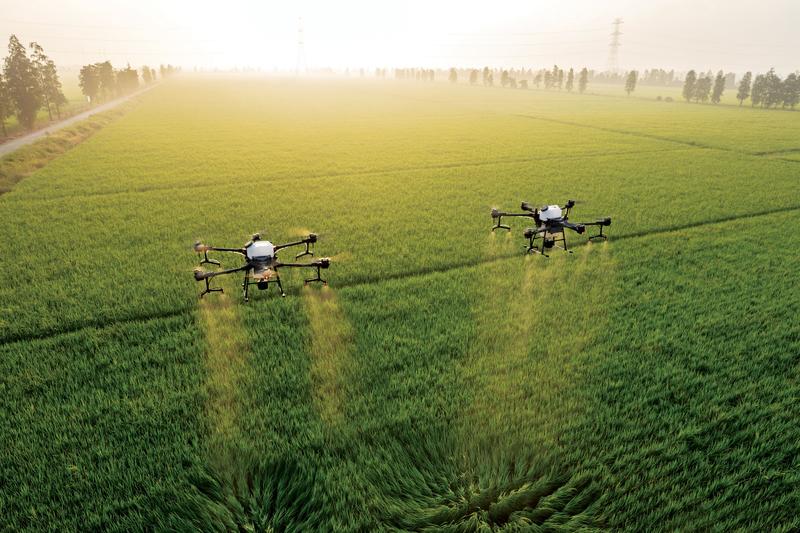 The cumulative operating area of plant protection drones by DJI, the world’s largest commercial drone manufacturer by market share, has more than doubled year-on-year so far. (PHOTO PROVIDED TO CHINA DAILY)
The cumulative operating area of plant protection drones by DJI, the world’s largest commercial drone manufacturer by market share, has more than doubled year-on-year so far. (PHOTO PROVIDED TO CHINA DAILY)
In Foshan, Guangdong province, most young laborers have left home to realize their dreams in top-tier cities like Guangzhou and Shenzhen. But Fu Wenlong, a drone operator in his 30s, chose to root his career in the city’s suburbs.
He co-founded startup Lingxiao Agricultural Technology Co to provide drone services for local farmers two years ago and his drones have been up in the sky for more than 400 hours to date, protecting some 1,334 hectares of agricultural land.
Piloting drones, as a new high-tech occupation, offers a unique opportunity for the younger generation to start their careers in the rural areas.
But the job is much more arduous than many people thought. For Fu, he sticks to a rigorous routine — leaving his home at 6 each morning to drive to the farm, prepare the pesticide and fly his drone right under the sun.
The scorching heat and swarms of mosquitoes are hard to bear. Nevertheless, Fu enjoys his work, especially on seeing the harvest after a tough day or having a simple lunch on the field with the farmers.
He said as farmers in Foshan have widely accepted drones for plant protection, plus the government’s support for developing the modern agriculture industry, more drone operators are desperately needed.
This year, for example, the weather is so unpredictable that pesticide spraying has to be done in less than a week during the peak season of plant pests and diseases, but Fu pointed out that a worker could only cover 0.33 to 0.53 hectares per day conventionally, and it’s difficult to find enough workers within a short time due to an aging agricultural population in Foshan.
However, one drone can spray 13.33 hectares at least each day. Accurate sprays with drones can also help farmers save up to 20 percent of pesticides and fertilizers and raise efficiency by 95 percent, said Fu.
His team of drone pilots was expanded from two in 2018 to 12 at present, serving hundreds of farmers around Foshan. But this is still far behind the town’s agricultural development demand, he said.
Fu has trained eight drone operators, who used to be harvester drivers, but they’re still short of at least five.
Members of the younger generation are mostly reluctant to join the agriculture production process, said Fu, frowning at recruiting new blood.
But operating drones has become a new career choice for young people in the suburbs. By late 2019, the number of civilian unmanned aerial vehicle pilot licenses in China had reached 67,218 — up by more than 50 percent over the previous year — according to data from the Civil Aviation Administration of China.
The Ministry of Human Resources and Social Security says about 15 percent of these licenses have gone to the agriculture sector — one of the four main application fields besides photography, measurement and patrol.
It says the industry will need up to 100,000 drones and 400,000 pilots this year alone.


